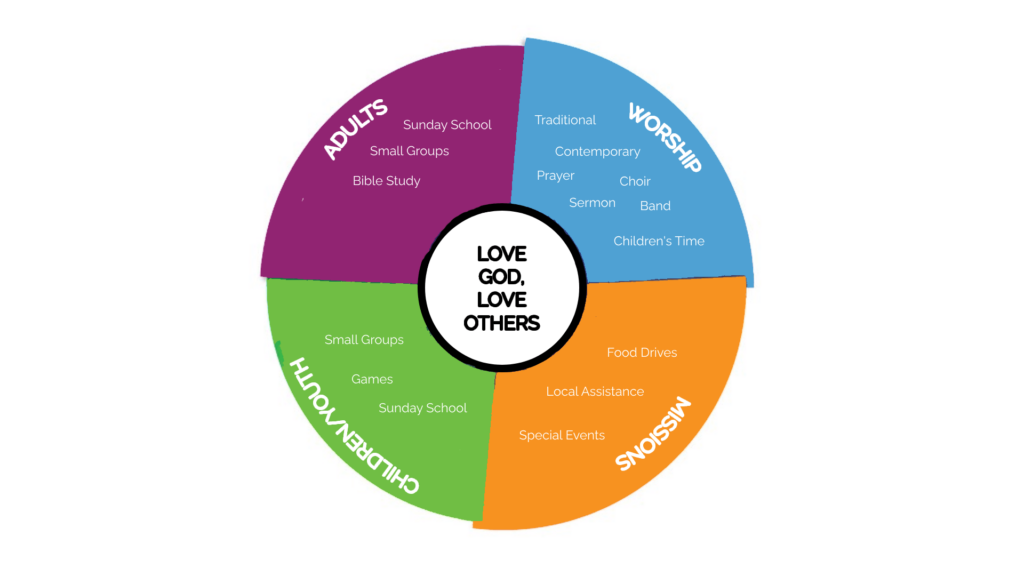Rethinking the Church Model
Look around at most churches, and a familiar pattern emerges. Sunday worship (perhaps a midweek service too), student ministries, children’s programs, adult groups, missions initiatives, a choir, and a band (especially if contemporary worship is part of the service). Maybe an occasional church-wide Bible study rounds out the offerings. This standardized model, while functional, often leaves a sense of sameness and can unintentionally fail to engage part of the community. Dare to be different. While larger churches might offer a wider array of programs, the core structure often remains remarkably similar. This begs the question: are we truly reaching everyone we can, or are we missing opportunities to connect with people in innovative and meaningful ways?
The Challenge of the Familiar

While there’s comfort in the familiar, the church faces a growing challenge in a rapidly changing world. Many people, particularly those who haven’t grown up in the church, find the traditional model intimidating or irrelevant to their lives. We often assume a certain level of biblical literacy among our congregations, which, in reality, may not exist.
Think about this. People tend to stop going to church after high school. When they come back, it’s usually when they want their kids to learn about God. That means there’s a large gap from when they leave church until they return. There’s also a loss of knowledge during that time.
How many people in the pews could confidently explain the overarching narrative of the Bible, the significance of Jesus’ resurrection, or the core tenets of Christian faith? We may not be speaking a language they understand. This disconnect is further amplified by the fact that many individuals leave the church during their teenage years and don’t return until they have children, often decades later. Others might attend sporadically, drawn in by friends or family, without a genuine understanding of the faith. This “gap” in engagement represents a significant mission field, a group of people who are spiritually curious but perhaps alienated by traditional church structures. Dare to be different.
Embracing Innovation: Ways to Be Different

So, how can we break free from the conventional and create ministries that truly resonate with a diverse and often disconnected population? Here are three strategies to consider:
- Create an Online Ministry for New and Returning Members: The digital age is upon us. It presents an opportunity to reach people where they are. An online ministry specifically designed for those new to the faith or returning after a long absence can provide a safe and accessible space to explore spiritual questions and learn at their own pace. This could encompass a variety of formats and topics:
- Bible Basics: A series of short videos or interactive lessons explaining the structure of the Bible, key themes, and practical tips for personal study. This can help explain scripture and empower individuals to engage on their own. Create content that explains different Bible translations and offers guidance on choosing one. Include resources like Biblegateway.com or your favorite commentary to share the historical context of the Bible and how it applies to contemporary life.
- Topical Q&As: Address common questions and concerns that newcomers might have. Explore topics like forgiveness, doubt, suffering, and the meaning of life from a Christian perspective. Share how to integrate faith into daily life, covering topics like prayer, relationships, and ethical decision-making. Consider creating content that addresses specific life stages or demographics, such as young adults, single parents, or those struggling with addiction.
- The Story of Jesus: Present the life and teachings of Jesus in a compelling and accessible way. After all, it’s the greatest story ever told. Use storytelling, dramatic readings, or short films to bring the Gospel to life. Focus on the core message of love, grace, and redemption. Offer different perspectives on Jesus’ ministry, highlighting his compassion for the marginalized and his challenge to the status quo. Take them through the Gospels, highlighting key events and teachings.
Other Ways to be Different
- Beyond Sunday: The church shouldn’t be confined to its physical building or Sunday mornings. Engage with the local community, showing the love of Jesus.
- Service Projects: Offer regular opportunities for members to serve their community by volunteering at a food bank, mentoring at-risk youth, or cleaning up a local park. Acts of service address real needs and provide for an expression of faith in action.
- Community Partnerships: Collaborate with local organizations to address social issues and promote positive change. This could involve partnering with schools, hospitals, or non-profits to offer support and resources.
- Open Events: Host events for the community. From concerts and film screenings to workshops and lectures on relevant topics. Create a welcoming environment where people can connect and learn.
- Mentorship and Discipleship Programs: Creating a culture of mentorship and discipleship is crucial for spiritual growth and a sense of belonging.
- One-on-One Mentoring: Pair new members with more seasoned members who can provide support. Mentors can help answer questions, offer encouragement, and model a life of faith.
- Personalized Growth Plans: Help individuals identify their spiritual gifts and develop a plan for spiritual growth. This could involve suggesting resources, recommending service opportunities, or connecting them with other ministries within the church.
Embracing innovation and moving beyond the traditional church model can create engaging and impactful ministries. If people feel disconnected, they’ll likely leave. Empower them to discover the transformative power of Jesus. It’s time to dare to be different and reimagine what it means to be the church in the 21st century.
If you’d like to have a strategy session to build programs specifically for your congregation, consider consulting retainer services. With a structured strategy program, we can set goals for new ministries, track progress, and have room to make adjustments.
The services we offer could help you make a difference in your community.
Reach out to Patrick to find out about retainers.
